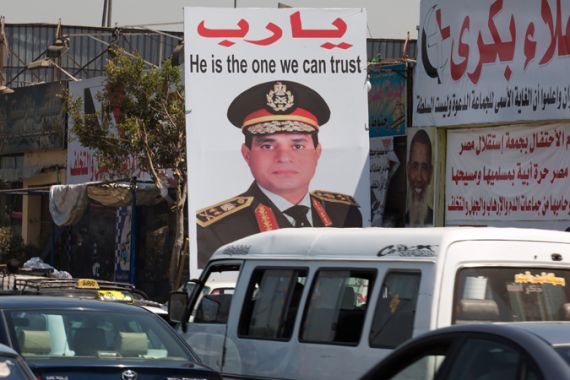Egypt: Making sense of the senseless
Egypt’s current regime must acknowledge that they inhabit a shared political space, all citizens have a right to occupy.

After weeks of pro-Morsi demonstrations, the Egyptian military has now chosen to use force to end the sit-ins. With fatigue and anger toward the demonstrators high in Cairo, General al-Sisi and his allies believe that they have another ‘popular mandate’ to reassert control. Appalling and unnecessary violence has been the predictable result. Why they chose this heavy-handed approach over an earlier plan to starve out the sit-ins is unclear, but this episode marks a dangerous turn in the conflict. Al-Sisi et al. seem to be following one of two strategies:
First, forcibly remove the Muslim Brotherhood from the political scene altogether. Despite extreme rhetoric in the anti-Morsi media, al-Sisi and his allies aren’t likely pursuing this strategy. Why? If the regime detained significant numbers of Muslim Brothers, it would still confront a problem akin to what Morsi faced as president: powerful and entrenched resistance. Morsi faced resistance from the ‘felool’ (remnants of the former regime) in strategic parts of the state bureaucracy thus constituting the so-called ‘deep state’.
But the Brotherhood has penetrated strategic parts of society such as professional associations. Al-Sisi et al. thus would face a hostile ‘deep society’ of organised social groups and purging the Brothers would likely be difficult. Earlier regimes failed to get rid of the Muslim Brotherhood and it’s unlikely that Sisi et al. will ignore this history.
A second strategy seems to better explain al-Sisi et al.’s conduct: the crackdown is a macabre form of negotiation. Here the idea would be to pressure an intransigent pro-Morsi camp to accept Morsi’s ouster as the starting point for negotiations. The army began by detaining Morsi and throwing some key Brotherhood leaders in jail. When this didn’t work, the military brass applied more pressure (resulting in the deaths of Egyptian citizens).
Beyond signalling to the Brotherhood the seriousness of their predicament, Sisi et al. likely hoped that by cutting off elements of the leadership from the rank-and-file, the protests would lose steam. Perhaps they hoped that the organisation would lose discipline and resort to more spectacular demonstrations of violence thereby sapping domestic and foreign support for the pro-Morsi camp. When this didn’t work, it was necessary to act against the hardcore supporters in the sit-ins. The danger of this approach is already becoming clear; it threatens to turn demonstrators into martyrs for democracy rather than for the Brotherhood and international outcry has been swift.
American politicians and pundits have rightly condemned the violence and calls to suspend military aid to Egypt are growing. The presupposition is that it is now time to use this diplomatic ‘leverage’ to restrain the military. There are a number of reasons why the US has less leverage than the rhetoric suggests, but one is worth emphasising. US military aid to Egypt supports American manufacturing jobs and many politicians in the US are loathe to do anything that might jeopardise them.
Faiyza abu al-Naga knew this. In 2012 she was Egyptian Minister of International Cooperation and, when it suited her political ambitions, she brazenly instigated the detention of the son of a member of President Obama’s cabinet (along with other NGO workers). Like abu al-Naga, al-Sisi and his allies are betting that American aid will continue uninterrupted. Should the violence in Egypt intensify and persist, US politicians might put more effective pressure on the military but, for now, Sisi et al. will likely proceed according to plan and shrug off American objections.
The recent violence will obviously complicate attempts at political reconciliation. Reconciliation is the only way forward, however. Both sides must acknowledge that they inhabit a shared political space that all citizens have a right to occupy. The Brotherhood failed to acknowledge this when they held power, the current regime appears to be suffering from the same shortsightedness.
Christian Donath is an Assistant Professor of Political Science at The American University in Cairo.
